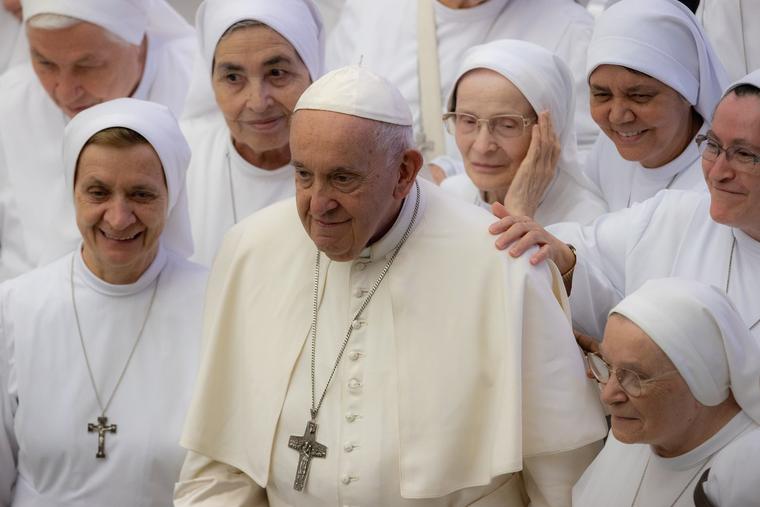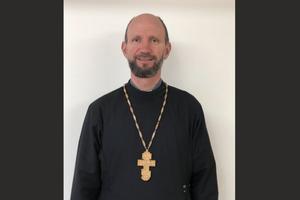Synod on Synodality: Role of Women in the Synodal Spotlight
Recent webinars provide insight into what will be discussed.

For those passionate about the role of women in the Church, the spotlight now is shifting to the Vatican, where 82 women will be participating in the Synod on Synodality — and in an historical first, 54 of them can vote.
The increased involvement of women in this synod gathering and the questions related to broadening women’s participation in the Church that are featured in the synod’s working document signal that the role of women will be a central theme at the Oct. 4-29 Vatican gathering. But which aspects of this key issue do the women who have participated in the synodal process want to see in the spotlight during the upcoming event?
A series of webinars hosted Sept. 13-14 by the World Women’s Observatory, in which a variety of women from around the world spoke about their hopes and concerns for the global meeting, provided some significant insights. The three online events sponsored by the Observatory, a project launched by the World Union of Catholic Women’s Organizations, were organized with groups of women who have participated in synod preparations, including some who will be in attendance in Rome.
The webinars were introduced by Sister Nathalie Becquart, who as undersecretary of the General Secretariat of the Synod has a unique and unprecedented role, and Mónica Santamarina, president general of the World Union of Catholic Women’s Organizations. Each featured two speakers and two panelists, with time allotted for questions delivered via text.
Sister Nathalie noted that there will be 54 female voting members, including two women who are among the nine delegated presidents appointed by Pope Francis: Sister Maria de los Dolores Palencia from Mexico and Momoko Nishimura from Japan.
This is reflective of women’s strong engagement throughout the diocesan, national and continental stages that preceded the October event, Sister Nathalie emphasized. “Women have participated a lot along the way,” she said.
‘Being Heard and Being Involved’
Santamarina presented the results of a survey of 449 women who participated in the local or continental preparations. When the women surveyed were asked, “Was your opinion heard during the synodal process?” the answer given by the vast majority was: “Almost always or always.” And 69% said they were effectively involved in decision-making.
“Being heard and being involved are important signs of change,” Santamarina said.
She told the Register that in an earlier survey in 2022, in Latin America and the Caribbean as well as in Africa, a significant percentage of women reported that they felt discriminated against and unheard.
But with the new results, she said, “The synodal process seems to be working very well.”
And their work to date has been concretely incorporated into the synod’s working document, known as the instrumentum laboris, which Sister Nathalie noted “was written by a team of 15 people, including women.”
Listening to Myriad Voices
While feeling listened to in the Church is something participants welcomed, the series of webinars also pointed to the fact that women’s perspectives are varied.
Sister Ester Maria Lucas shared her experience from Mozambique, a country that is 27% Catholic, where parishes in some regions are geographically spread more than 300 miles apart. Just over half of women in Mozambique are literate, compared to 74% of men.
There, Sister Ester Maria explained, the local Church faces the challenge of a local culture that “tends to restrict the spaces of action for women.”
“It's very important for the Church to help us to open up spaces where women can be actively involved,” she said.
By contrast, Austria’s Angelika Ritter-Grepl reported that “we are a community of women who are actively engaged in Church, society and politics for the concerns of women.”
Xiskya Lucia Valladares, who is a member of the synodal assembly by pontifical appointment, spoke of the role of women in the digital world. Originally from Latin America, with a Ph.D. in communications, she teaches at the CESAG University in Mallorca, Spain, affiliated with the Pontifical University of Comillas.
She noted that “as far as the internet is concerned, it appears that there seems to be no longer a gender difference: 56% of the users are women, as opposed to 40-plus percent of men.”
While women are more active on the internet, including with social media, she noted that in the Church, more men are missionaries in the digital world.
She suggested that for women religious in particular, difficulties with such apostolates might occur because the “structures of communities of women are much more rigid than those of men.”
Regardless of their particular concerns, however, a general characteristic might apply to women as a whole, suggested Nishimura.
On the path toward a synodal Church, she said, we need to consider “women as teachers of synodality.”
Women, by “dedicating time to those in need with simple gestures and words, by helping one another, giving advice to your families, collaborating and working together in parishes, dioceses, communities, workplaces” are already teaching practices that are the goal of a synodal Church.
Women and the Diaconate
The instrumentum laboris states “the question of women’s inclusion in the diaconate” will be discussed.
In her remarks, Ritter-Grepl asked if the synod is ready to propose a “different approach to priesthood,” expressing her hope for the inclusion of women in ordained ministry and “especially the diaconate.”
This issue was also raised by other speakers. Medical Mission Sister Birgit Weiler, a German theologian who lives in Peru and participated in the 2019 Amazon synod, said that many men and women in Latin America “demand” active deaconship for women as a step that reflects the “baptismal dignity of women.”
“Of course, they cannot celebrate the sacrament, but many bishops in the Amazon delegate to women also the celebration, say, of baptisms or weddings, simply because there is a dearth of priests,” Sister Birgit said.
“They are already living this gift as deacons,” she added. “So it would be most certainly worthwhile carrying forward this reflection.”
While Sister Birgit was the most vocal on the topic of a women’s diaconate during the first webinar, Barbara Dowding, the first lay person and woman to serve as chancellor in the Archdiocese of Vancouver, reported that during the synod’s continental stage she heard many people who “felt women’s voices should be more carefully considered and appreciated, especially when it came to matters around leadership roles, decision-making, and those calls for the ordination of women as deacons and even priests.”
Clericalism
A recent World Women’s Observatory report found that women from different continents expressed in their survey that “clericalism, often founded on the patriarchal culture of the society in which they live, exacerbates and explains, to a large extent, the discrimination they suffer.”
Clericalism is an excessive deference towards the clergy and also includes cases where a member of the clergy identifies himself as privileged and therefore exempt from the standards to which others are held.
The problem of clericalism — which Pope Francis has strongly denounced as “ a perversion of the priesthood” — also was highlighted multiple times throughout the synod’s preparatory webinar, previewing it as another expected topic of discussion in October.
According to two of the speakers, a bishop’s attitude toward his flock is critical in combating clericalism.
Julia McStravog, a former staffer at the U.S. Conference of Catholic Bishops who served as co-coordinator of the USCCB’s team for the synod’s continental phase, cited the positive example she has witnessed during the synodal process.
“I have had an incredibly positive experience and working relationship with Bishop [Daniel] Flores, who is leading the synod in the United States,” she said, attributing this positive dynamic partly to the fact “that he likes to think with people.”
Dowding agreed that women working “collaboratively” with bishops is a good start and that the Church needs to cultivate more “listening” bishops.
“From my limited experience in Western Canada, we've been really fortunate with our bishops and archbishops who are very supportive of women and the role of women in the Church and have given us many opportunities to serve in those capacities,” she said.
Synodality in Action
Whatever specifically ensues this month at the Vatican, synod delegated president Nishimura said her own experience working with the Asian continental preparations has already communicated the value of striving for a more synodal Church.
“There were many times when I felt as if my mind and my heart were being opened,” she said. “And I believe this is the fruit of the spirit of synodality. It is hard to express in words, but it was clear to me that a Church that walks together, that is synodal, can be realized when each one of us practices this: the listening and discerning together in this way.”

















